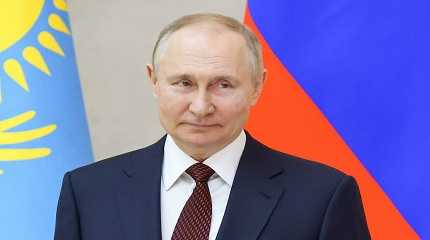
MOSCOW, Oct 10 (Reuters) - Russian President Vladimir Putin on Tuesday said the explosion of violence between Israel and the Palestinians showed the failure of U.S. policy in the Middle East, and the Kremlin said it was in touch with both the warring sides.
Putin's spokesman said Moscow would seek to play a role in resolving the conflict, but did not specify how. Instead, Putin took the opportunity to blame the sharp escalation on years of U.S. policy in the region.
"I think that many people will agree with me that this is a vivid example of the failure of United States policy in the Middle East," Putin told visiting Iraqi Prime Minister Mohammed Shia Al-Sudani.
Putin said the United States had sought to "monopolise" international efforts at forging peace, and accused Washington of neglecting to seek compromises that would be acceptable to both sides.
The United States, Putin said, had ignored the interests of Palestinians, including their need for their own independent Palestinian state.
He did not mention Russia's own role in the Middle East peace process over the years. Along with the United States, the United Nations and the European Union, it has since 2002 formed part of a "Quartet" of powers charged with helping to mediate.
Israel is pounding Gaza with the fiercest air strikes in the 75-year history of its conflict with the Palestinians, in response to a wave of deadly Hamas attacks at the weekend. Moscow has said it is worried that the violence could escalate into a broader conflict in the Middle East.
Since the latest crisis erupted, the Kremlin has sought to appear even-handed, underlining the strength of its relations with both sides.
Moscow has long-standing ties with the Palestinians, including Hamas, which last sent a senior delegation for talks in Moscow in March. But it also has "a lot in common" with Israel, including the fact that many Israelis are former Russian citizens, Kremlin spokesman Dmitry Peskov said.
"Therefore, we maintain relations with both sides of this conflict. We conduct contacts and take part in all the - unfortunately few - formats that are looking for common ground for a settlement and which do not work very effectively, as recent practice has shown," he said.
"But nevertheless we intend to keep making efforts and play our role in terms of providing assistance to seek ways to a settlement."
Peskov said the Kremlin was trying to establish whether any Russians were among the dozens of hostages taken by Hamas.
"The necessary contacts are being made in order to understand whether this is true or not and what the future fate of these people is," he said.
Peskov said a suggestion by Ukrainian President Volodymyr Zelenskiy that it was in Russia's interests to stoke war in the Middle East to weaken global unity had "absolutely no basis".
"This is a long-standing conflict, the Palestinian-Israeli conflict, which has very deep roots, many deep contradictions. Many people know the backstory, but it is so deep that not everyone knows the nuances," he said.




